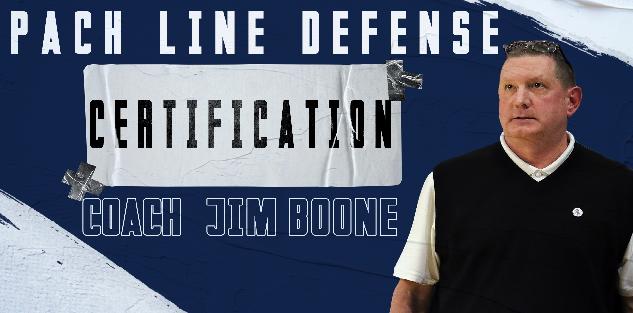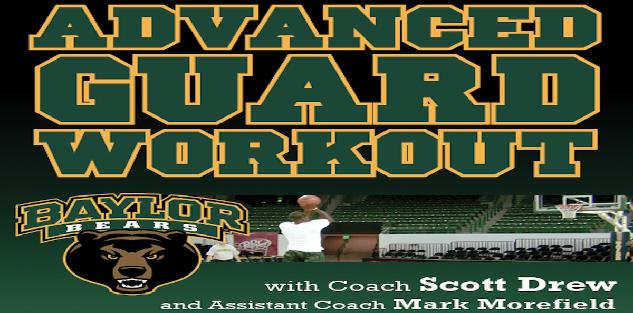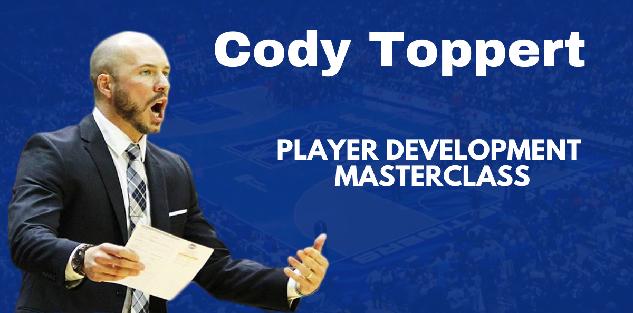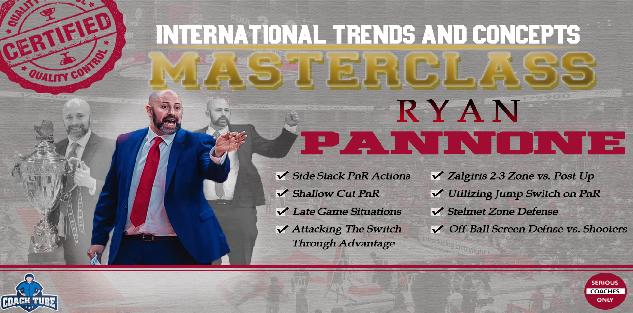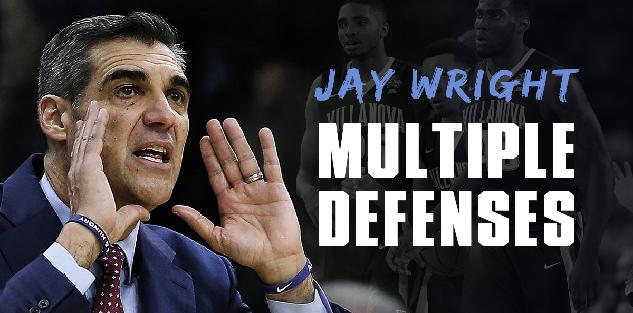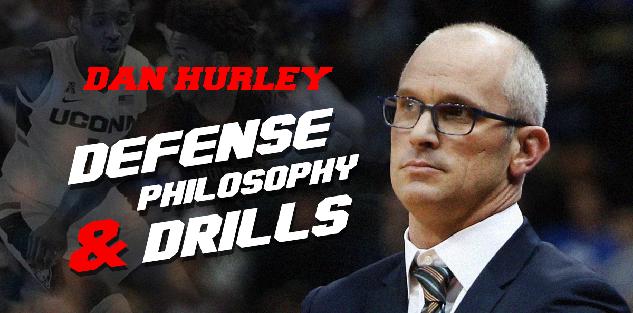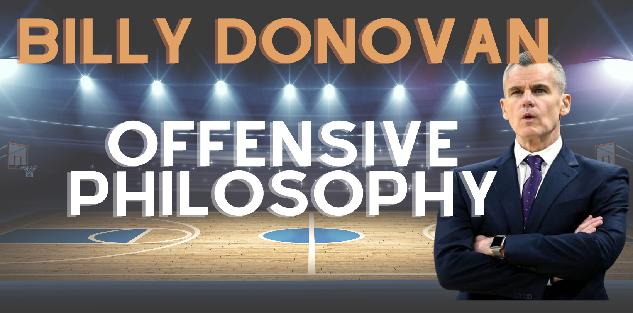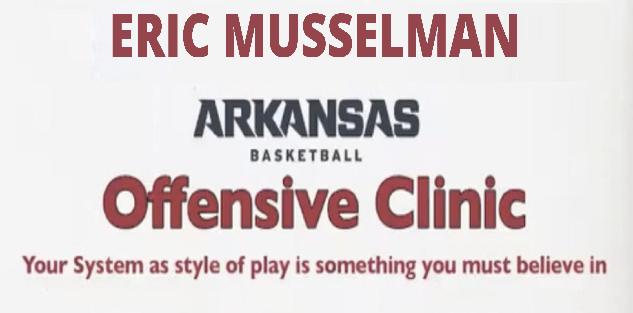Featured courses
- Two Great Game Situational Workouts For the Basketball Offseason by Grant Young
- Two Reads Basketball Players Must Understand Before Executing the Ball-Screen by Grant Young
- Two of LSU Coach Kim Mulkey’s Game-Winning Inbounds Plays by Grant Young
- Three Effective Early-Season Defensive Basketball Drills by Grant Young
- Four Essential Tips For Basketball’s 1-3-1 Zone Defense by Grant Young
- Four Zone Defense Drills to Strengthen Your Team by Grant Young
- How to Beat the Three Most Common Pick and Roll Coverages by Grant Young
- Two Drills to Improve Shooting at the Start of the Basketball Season by Grant Young
- Core Basketball Principles That Dallas Mavericks Coach Sean Sweeney Teaches by Grant Young
- Three Competitive Shooting Drills For Your Basketball Team by Grant Young
- How To Teach The ‘I’ Generation of Basketball Players by Grant Young
- Three Elite Drills to Begin a Basketball Practice With by Grant Young
- How to Build a Championship-Winning Basketball Team Culture by Grant Young
- Two of Texas Women’s Basketball Coach Vic Schaefer’s Tips For Team Culture by Grant Young
- Atlanta Dream WNBA Coach Brandi Poole’s Four Sets for Secondary Offense by Grant Young
- NC State Basketball Coach Brett Nelson’s 4 Crucial Point Guard Qualities by Grant Young
- Kentucky Coach Mark Pope’s Five Guard Rules For Offense by Grant Young
- McNeese State Basketball Coach Will Wade’s 4 Core Pillars by Grant Young
- 4 Tips To Instantly Improve Your Free Throw Shooting by Tyler Linderman
- Assemble a Championship-Caliber Basketball Rotation by Brandon Ogle
- Two of UConn Coach Dan Hurley’s Key Defensive Drills by Grant Young
- Four Post Moves All Basketball Forwards Should Have In Their Bag by Grant Young
- Four of Baylor Coach Nicki Collen’s Midseason Pick and Roll Adjustments by Grant Young
- WNBA Legend Sue Bird’s Two Tips For Attacking on Offense by Grant Young
- Houston Coach Kelvin Sampson’s Three Keys for Building a Basketball Program by Grant Young
- Two of Tom Izzo’s Top Michigan State Defensive Drills by Grant Young
- Four of Olympic Gold Medalist Coach Mechelle Freeman’s Relay Race Strategies by Grant Young
- Three Key Strategies Will Wade Uses to Build a Dominant Team by William Markey
- Five UConn Huskies Men’s Basketball Plays That You Can Use by Grant Young
- Three Tips for Maintaining Team Culture at the End of a Basketball Season by Grant Young
- Three Dribble Drive Motion Drills to Teach Your Basketball Team by Grant Young
- Three Dribbling Drills For Non-Primary Ball Handlers by Grant Young
- Four Advanced Ball Handling Drills For Basketball Guards by Grant Young
- Three Tips to Sharpen Your Post Player’s Footwork in Basketball by Grant Young
- These Three Pick and Roll Drills Are Crucial For Any Ball Screen Offense by Grant Young
- Three Closeout Drills to Improve Basketball Shooting Defense by Grant Young
- Three Tips to Perfect the Packline Defense in Basketball by Grant Young
- Four Keys to Executing the Read and React Offense in Basketball by Grant Young
- Three Tips to Develop Elite Basketball Shooters by Grant Young
- Three Crucial Keys to Executing the 5 Out Offense in Basketball by Grant Young
- These Three Offensive Sets Will Help You Beat Any Zone Defense by Grant Young
- Three Transition Basketball Drills To Play With More Pace by Grant Young
- Three 5 Out Offense Drills Any Basketball Coach Can Use by Grant Young
- Four Vital Techniques for a Motion Offense in Basketball by Grant Young
- Three Baseline Inbounds Plays To Win Your Basketball Team Games by Grant Young
- Four Drills For Sharpening the European Ball Screen Offense by Grant Young
- Three Positioning Tricks For a Basketball Zone Offense by Grant Young
- Three Rules to Perfecting Basketball's Lock Left Defensive System by Grant Young
- UCLA WBB Coach Cori Close’s Two Keys to Winning the Mental Game by Grant Young
- Four of Alabama Coach Nate Oats’ Favorite Basketball Drills by Grant Young
- Three Ways To Turn Transition Offense in Basketball Into Points by Grant Young
- Three Drills to Master Basketball's Pack Line Defense by Grant Young
- Three Transition Defense Drills to Halt Fast Breaks by Grant Young
- Four Offensive Rebounding Drills to Win Second Possessions by Grant Young
- 4 Defensive Technique Drills from Boston Celtics Assistant Coach Brandon Bailey by Marek Hulva
- 5 Drills to Improve Ball Handling by Tyler Linderman
- 13 FUNNY BASKETBALL GIFS by Alex
- BASKETBALL SPEED AND AGILITY: 8 QUESTIONS FOR COACHTUBE EXPERT RICH STONER by Jaycob Ammerman
- Defensive Strategies for Basketball by Ryan Brennan
- 4 Keys To Turning Your Program Into Championship Contender By Dallas Mavericks Coach Sean Sweeney by Marek Hulva
- 5 Components to Creating a Winning Basketball Program by Justin Tran
- Guide to Becoming a Lethal Scorer in Basketball by Justin Tran
- Zone Defense In the NBA Eastern Conference Finals by James Locke
- Mastering Court Mobility: Tips for Effective Movement in Basketball by Justin Tran
- 5 Basketball Shooting Drills: How to Develop a Sharpshooter by James Locke
- 6 Points of Emphasis for a Successful 5 Out Offense by Jaycob Ammerman
- Effective and Efficient Methods to Practice During the Basketball Season by Justin Tran
- Three Great Passing Drills From a Basketball Coaching Legend by Grant Young
- 7 Principles For Perfecting the Princeton Offense in Basketball by Grant Young
- How to Replicate A Modern NBA Offense by Grant Young
- Three Great Two-Ball Dribbling Drills For Basketball Development by Grant Young
- Two Rebounding Drills to Win Your Basketball Team Championships by Grant Young
- How to Improve Your Basketball Team’s Defense With the Shell Drill by Grant Young
- How Baylor Basketball’s Scott Drew Develops Elite Guard Play by Grant Young
- Off-Ball Movement Tips and Strategies: Lessons From the NBA Finals by James Locke
- Player Development: Scott Drew’s Tips for Producing NBA Guards by James Locke
- How to Execute a Spread Offense in Basketball by Grant Young
- Four Quality Quotes From Four Final Four Coaches by Grant Young
- A Guide to the Pack Line Defense by Alex Martinez
- 3 Defensive Build Up Drills to Improve Team Basketball Defense by Grant Young
- Battle of Two Great Coaches: Best Plays from the NBA Finals Contenders by Justin Tran
- 10 Creative Ways Athletic Programs Can Use a Video Board to Raise Money by Coach Williams
- How to Use 3 on 3 to Improve Your Basketball Team by Grant Young
- How to Defend the Pick and Roll by Grant Young
- Mastering Basketball Defense: Techniques, Drills, and Strategies for Success by Justin Tran
- Three Tips From The Coach Who Developed Giannis Antetokoumnpo by Grant Young
- 2023 NBA Draft: Skills and Technique from Top Prospects by Justin Tran
- From College to the Pros: Transitioning the Dribble Drive Offense by Justin Tran
- Positionless Basketball: Redefining Roles on the Court by Justin Tran
- Revolutionize Your Offense: Proven Concepts to Elevate Your Basketball Game by Justin Tran
- 5 Essential Fastbreak Drills Every Basketball Coach Should Know by James Locke
- How to Run a Circle Offense in Basketball by Grant Young
- Game-Changing Strategies: ATO Plays in the EuroLeague and Olympics by Justin Tran
- How to Stand Out at Basketball Tryouts by Grant Young
- How to Improve Your Basketball Team’s Transition Defense by Grant Young
- Indiana Fever GM Lin Dunn’s Two Keys For Women’s Basketball Coaches by Grant Young
- Strength Training Strategies Every Basketball Player Should Have by Grant Young
- A WNBA Basketball Coach’s Four Priorities In Transition Defense by Grant Young
- Three Adjustments to Make When Your Basketball Offense Isn’t Working by Grant Young
- Three Pillars to Applying Defensive Pressure on the Basketball Court by Grant Young
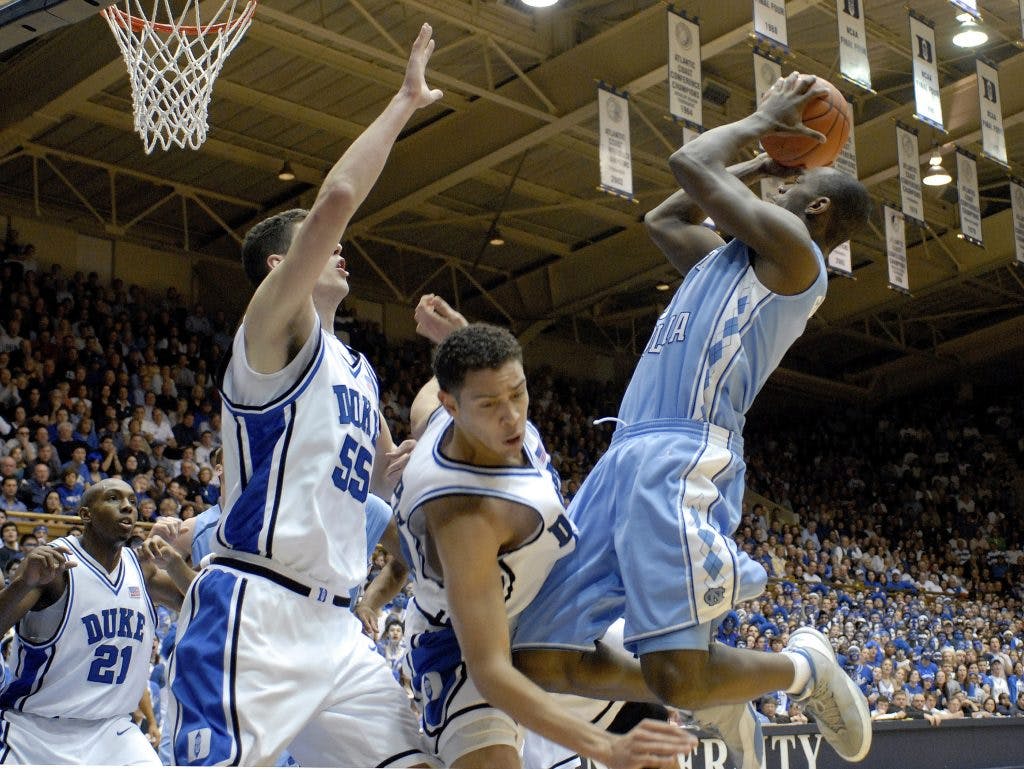
MARCUS GINYARD TALKS AAU BALL, ROY WILLIAMS, AND PLAYING PROFESSIONALLY
- By Brandon
Born in Rochester, NY, Marcus Ginyard has had quite the ride throughout his basketball career. From playing on a star-studded AAU team in his teens to playing college ball with the UNC Tar Heels, one of America’s elite basketball powerhouses, Ginyard’s skills on the hardwood speak for themselves.
During his stay at North Carolina, Ginyard racked up a reel of honors thanks to his defensive prowess and was a member of the 2009 National Championship team. After going undrafted, Ginyard chose to take his talents overseas and play professionally in Germany, where he averaged 11 points a game with BBC Bayreuth.
For his second season, Marcus signed on with Ironi Nahariya in Israel and quickly excelled, averaging of 21 points and 7 rebounds a game. In his third season, he made it back up to a top division in the Polish Tauron Basket Liga, playing with Anwil Wloclawek. Marcus led his team to the semi-finals and once again was a double-digit scorer.
He later signed with BC Azovmash of the Ukrainian Superleague, averaging over 15 points a game and putting together yet another effective campaign in overseas hoops. He is now back in the states, playing for the Westchester Knicks of the NBA D-League.
Growing as a Player While playing in Chapel Hill, Marcus Ginyard was largely known as a defensive-stopper. He was a coach’s dream – willing to work hard, make the hustle plays, and devote his energy to neutralizing the opposition’s most dangerous scorer.
As his career has progressed, the rest of Ginyard’s game has gradually elevated to the level of his defensive prowess. Ginyard has become an effective, efficient scorer on the offensive end and has rounded himself out as a complete player.
Serving as a Role-Model In today’s world, most kids look up to their favorite athletes. While not all athletes embrace the responsibility of being a role model, Marcus Ginyard has chosen to make his life a positive example.
Along with his talents on the court, Marcus has been a consistent advocate for education and academics. While playing at UNC, despite the pressures and spotlight of a national championship victory, Marcus completed his bachelors degree in Communications.
He also hosts an annual basketball camp in Alexandria, VA designed to work on the fundamentals and provide a fun learning experience for kids.
Recently, I had the chance to catch up with Marcus and discussed various things about his basketball journey.
BO: Could you describe the role your older brother, Ronald, had in your growth as a player?
MG: My brother has played a very important role in my growth as a young player, and even now as a professional. He was an assistant coach at my high school for my last two years, which was a huge boost for me. It was a blessing to be coached by someone I had such a strong relationship with. It was much easier for me to take criticism and direction from someone I knew wanted the best for me. Even to this day, my brother works me out in the off-season.
BO: You played on an AAU team with guys like Ty Lawson and Roy Hibbert. How much importance do you think teen basketball players should put on playing in the AAU circuit based on your experience?
MG: My experience in AAU will be significantly different than the experience that young teens will have now. The atmosphere has changed drastically. For me, it was a very effective way to be surrounded with top players, and play against top competition. When I was coming up, the AAU circuit was one of the best ways to showcase your talents for the college coaches.
BO: After breaking your wrist before your freshman season at UNC, can you break down the rehab process that got you ready for the start of the season?
MG: I had surgery on my wrist in August of 2005 and was cleared for the first practice in October. My rehab process was very intense, but we had to be aggressive if I wanted to be available for all of my basketball activities. After placing a screw in my bone, there was no question about the strength of the bone, the only issue was my mobility and range of motion. The great thing about a hand injury is that I could still condition and keep myself in pretty decent shape. Throughout my injury, I continued to lift weights one handed.
BO: At UNC, you were coached by Roy Williams. As a lifelong Jayhawk fan, I know plenty about Coach Williams. What would you say separates him from other coaches in college basketball and how did he put you in the right place for success?
MG: I think what separates him the most is his passion for the game along with the passion for his players. He cares deeply about how his players progress as players and as people. His resume speaks for itself, but ask anyone about his or her time with Coach Williams, and everyone will have great things to say about his character. The game of basketball is such a great teacher for life, and Coach Williams always taught us how to approach our games and our lives with intensity, integrity and passion.
BO: Being a defensive stopper, is there any player currently in the NBA who you see resemblances from your game? Do you believe every team needs a guy that can go out and shut down (or at least throw them off their rhythm) a Kevin Durant or LeBron James?
MG: There are a few players that come to mind. Matt Barnes and Tony Allen come to mind first. I do believe every team needs a player that not only defends well, but takes a high level of pride in stopping their opponent.
BO: In a landscape mired by one-and-done’s, could you tell our readers how important it was for you to stay all four years and get a degree? Also, what would you tell younger guys that think about leaving early, despite the draft situation not being entirely clear, maybe like Aaron Harrison (Kentucky) or Christian Wood (UNLV) from this most recent draft?
MG: The one and done situation is a very difficult thing to navigate. I am extremely blessed to have completed my school and earned a degree from UNC. Getting an education was the top priority for me going into college. For the younger guys that are thinking about leaving early, I would say to find a very small team of trusted individuals to help make the decision. Those people are not the same for every player. For some players their families may take them in the wrong direction, for others they will keep them grounded. But in the industry of professional sports, there is only a small window of time that you can earn a living with your body being in its prime, which makes things a bit more complicated.
BO: How would you compare playing overseas versus in the United States?
MG: I have absolutely loved playing overseas. It’s an incredible opportunity to see the world, play a game you love, and earn a living at the same time. I’ve been lucky to play for some great organizations, and for enthusiastic and supportive fans in countries I had never been to. In the last 5 years, I have been able to travel to over 25 countries as a result of being a professional in Europe.
BO: Many players might be hesitant to play overseas due to the language barrier. Was this much of an issue for you during your various stops?
MG: This was a non-issue. It’s good to be out of your comfort zone.
BO: Lastly, you’re back in the States now playing with the Westchester Knicks of the D-League. What ultimately made you want to return and is playing in the NBA your ultimate goal for your basketball career?
MG: I am not currently playing for Westchester, but I did spend some time with them last season. At the time, the D League looked like a good option for me to play, and to be closer to an opportunity to break through into the NBA. My ultimate goal is to play at a high level. I am not fixated on the idea of playing in the NBA. Having a chance to play in the NBA would be a dream, but not playing in the NBA does not make my basketball career a failure.
I’d like to thank Marcus for participating in this interview and wish him the best in the future.
For more from Marcus, check out MarcusGinyard.com or follow him on Twitter @MG1NYARD

